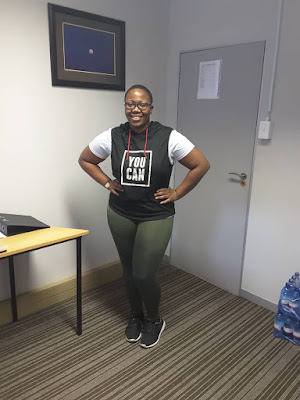If you answered no to all these, here’s the tip: Shut up.
As I expected, most of my friends who commented on the post assumed someone had fat-shamed. So they either shared their own experiences with fat-shaming, proffered similarly barbed ‘tips’ to fat-shamers, or tried to assuage me with idioms along the lines of ‘you are not fat, you have fat’. I said nothing. They had assumed wrongly that I had been fat-shamed, yet their reactions proved why I felt bad about being praised for having lost weight recently.

Actually, my post was inspired by comments from a few people, who gave me a rude awakening when they approached me to praise me for my recent weight-loss and, in so doing, compared me with either another woman or worse, with myself.
The back-handed compliments included:
“Ooo Monique I’m so proud of you! See how better you look now! If you had started this sometime back you would be married by now I bet!”
“Wow, Monique! You have done it oo! Please tell [X] to follow your example. With your new looks and everything else you will pass those slay queens”
“I can see you’re working on your weight; that is good. I’m proud of this new you, she is definitely better”
And, with these comments, I felt shame. Shame because, suddenly, my weight-loss journey, something I should be proud of given that it is a testament to my growth in other areas of my life (mental, spiritual, and emotional) was suddenly made shallow. It was being reduced to me finally fitting in, meeting social standards of what beauty is. I felt shame because I told these people ‘thank you’, even though their compliments felt slimy. After all, when you say ‘thank you’ to someone who has said you are now improved based on your ‘new look/size’, aren’t you agreeing with them that you had been less than before?
These people are friends, I don’t mean to ‘shame’ them in a post talking about shaming. I don’t even know if they will read this post, but I hope they do and recognize their words. Above all, I am writing because this has been on my mind and I hope they – along with others – would read and understand why their words are unsatisfactory.
***
I may be wrong, but I believe fat-shaming is the most popular form of shaming in our society. If not, I think it comes second only to intelligence shaming. The most popular insults in my experience have been “fool, stupid, fat, and ugly”; often combined for maximum effect. It’s generally accepted that no one wants to be FAT (or stupid), it is an unfortunate thing we must all fight. Curvy, yes; a round ass and big boobs are fine if you have a thin waist and skinny legs and are not short and, and, and… God alone knows who came up with this nonsense. But we’ve accepted it as the ideal for women. And because it’s widely accepted, this fat-shaming is accepted too.

People with no medical knowledge at all feel the need to offer unsolicited health advice to fat people. Feeling stressed? It must be your weight. Have acne? It’s because you don’t exercise. Nearly everything but your finances – and sometimes even that – would be better if you were the ideal size, but you’re not. Fat-shaming is accepted because, as in the case of calling out names of the ‘bottom-ten’ students with regards to academic performance, it is supposedly for the person’s own good. They’re supposedly shaming you because “they care about you” and want you to be a better you. The better you is slimmer and passes standardized tests.
It is because fat-shaming is accepted that, within the past month lone, two male acquaintances have dedicated their WhatsApp statuses to fat-shaming.
One (let’s call him ‘C’ with the hope he’ll recognize himself) felt he needed to rant about how “fat people are unseemly, smell because they have more flesh to sweat through, can’t even walk well, and almost always have health problems”
Another (he shall be reduced to ‘D’, the initial of his name) made several posts featuring Instagram fitness models, saying “This could be you and I but you’re not working on your body”. Suggesting, of course, that women who aren’t as fit as these models don’t deserve him. Because he believes he’s too good for them.

Fat-shaming is not always as obvious as this and, to be honest, it’s not something I have taken issue with for a while now. With the crop of body-positive content on the liberal media, I had formed my own image of the “ideal” by the end of 2017. In fact, I had genuinely accepted myself – fat and all –, so much so that I realized that other areas of my life had contributed to it, areas I needed to work on and not continue escaping from. As renowned psychologist, Carl Rogers is noted for saying, “The curious paradox is that when I accept myself just as I am, then I can change”.
What has brought fat-shaming to the forefront for me recently has been the need to make it clear – with every back-handed compliment – that mine is not the average weight-loss journey, and that I am not the one you should compliment on being thin for thinness’ sake. My goal is not to be who you think I should look like, my goal is not to be better than another woman, and I refuse to be made to feel bad about who I have been, especially considering that who I am becoming hinges on the sum of ALL my experiences. So yes, I have lost weight, yes I do plan to and will lose more. But being thin has never been my goal. I’ll always be fat by society’s standards. Or, as I like to think of it, Fatté…




9 Comments
This. I almost shot up from my bed like "????Yeeessss!"; Not because "someone finally spoke" my mind and feelings. I love what I've learned; I love how you have addressed many issues we know all too well. I love how I can deeply relate to this article.
Conclusion: I'm doing #more me #for me.
Thank you for reading! I truly appreciate it!
Thank you Mo.Personally went through this as a teenager and i would like to use this post to introduce this topic to my daughters.i relate to this deep down there….
Its great that you broke through the chains holding you down to own what you worked for. As time changes our definitions and ideals change. Its still the same you. Size never defined who you were. Society did. Kudos
I'm glad this will spark a convo with your daughters! Thanks for reading and sharing your kindred experience
Thanks for this. Those last two sentences are powerful.
Glad we had this conversation Mo. Enabled me to break down the complexities of this struggle that I dealt with as a teenager. Everyone screams "Love yourself just as you are" but turns around and shows a clear preference for a particular version of us. It is a mental battle – easier handled once you know what you want out of it besides just compliments. I echo your sentiment – ALL VERSIONS OF MONIQUE ARE BEAUTIFUL!
I'm glad we had this conversation as well. And I appreciate your understanding of how these compliments may derail and reveal the hypocrisy of the "love yourself as you are" preaching
All versions of Monique are beautiful indeed. Be you, feel beautiful in you. Be in comparison with you only. I love the way you spelt this here. Enjoyed the read.